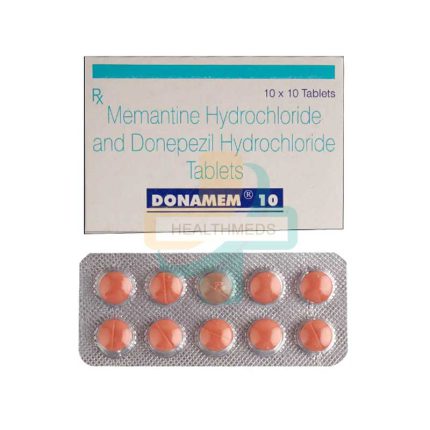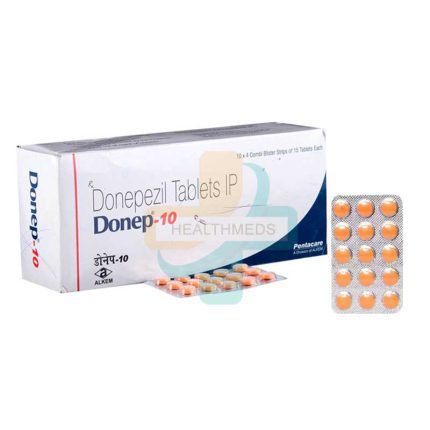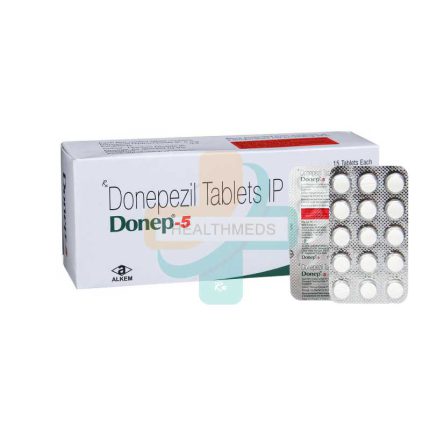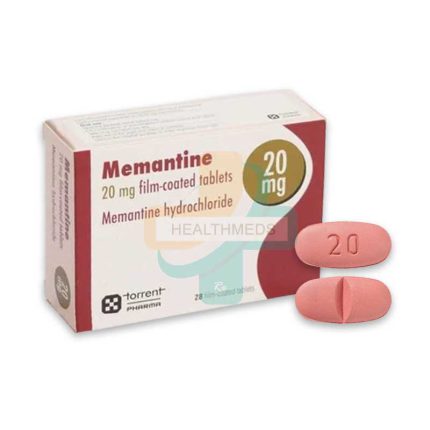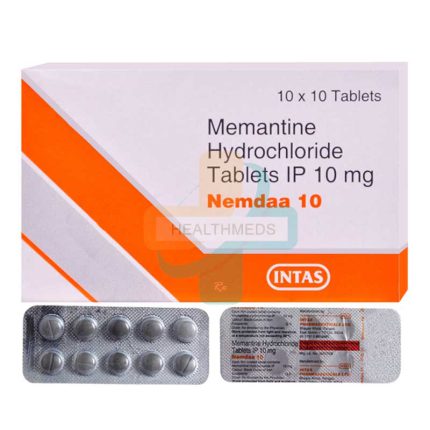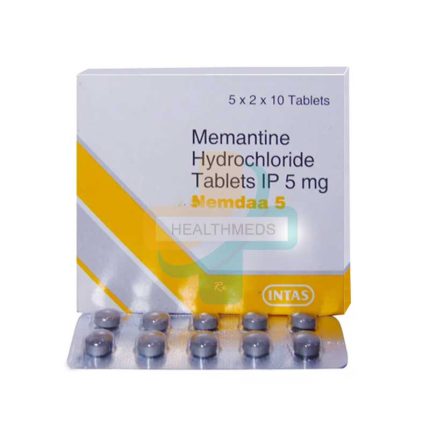Showing all 7 results
Alzheimer’s disorder (AD) is one of the most common health disorders found in old men and women. Revolutionary neurological degeneration with age, health issues, etc impacts cognitive characteristics and reminiscence.
Such circumstance was first recognized in 1906 by using Drs. Named after Eloise Alzheimer’s. It is characterized using an accumulation of extraordinary proteins which include beta-amyloid plaques and tau tangles within the mind.
As a result, communication between neurons is disrupted, ultimately damaging important brain regions. The usual signs of Alzheimer's include, memory loss, cognitive impairment, and decline in general cognition are often seen in older adults.
Earlier in most cases with Alzheimer's, old age was a common factor. However, a lot of middle-aged people in their late 50's are now prone to Alzheimer's. As the disease progresses, people may additionally face difficulty with speech, selection-making, and everyday activities that can in the end severely affect their lives.
Currently, there may be no cure for Alzheimer's, but certain natural and pharmaceuticals can be considered the best remedies to control the signs and slow the progress of Alzheimer's.
Ongoing research efforts are looking to unravel the complicated mechanisms underlying Alzheimer's ailment and increase new techniques to enhance early diagnosis and treatment. With any luck improving results were powerful for the ones suffering from this complex and great neurological sickness.
Why Alzheimer’s disease?
Alzheimer’s ailment (AD) is tough to apprehend. Medical studies advocate diverse neurological, physiological, and mental factors that contribute to Alzheimer’s sickness.
Some common elements that contribute to the development of Alzheimer’s are as follows.
- Genetics: If your family history backs up Alzheimer’s disorder, especially loved ones like parents or siblings then there are high chance that you may become one like them.
- Age: One of the most common reasons for Alzheimer’s disease, growing age/old age. There are higher chances of neurological impairment to happen as one starts to age. One can always notice most people above the age of 65 face problems with memorizing, remembering previous events, etc.
- Genetic mutations: Some rare genetic mutations can cause Alzheimer’s disease syndrome to run in the entire family.
- Amyloid vesicles and tau tangles: The potential cause or progression of Alzheimer’s disease is because of abnormal protein build-up in the brain. This build-up of beta-amyloid plaques and tau tangles interferes with normal neurological functioning.
- Health Problems: Health problems such as Arthritis, cardiovascular risk factors such as high blood pressure, diabetes, and abnormal cholesterol level, or those associated with causing shrinking or choking to blood vessels can lead to Alzheimer’s disease
- Diet and Environmental Lifestyle: One who follows a strict diet and prefers to live a healthy lifestyle is prone to good health. Whereas it can be the opposite for one who does not. The often victims of Alzheimer’s are people who followed Sedentary lifestyle, consumed poor nutrition level, lack of intellectual stimulation, and lack of social surrounding. To understand, prevent, and slow the progress of Alzheimer’s disease ongoing medical studies are conducted to understand the complex interplay between genes and the environment.
How to diagnose Alzheimer’s disorder?
To diagnose and apprehend the probability of Alzheimer’s disease, a comprehensive examination inclusive of expertise the preceding or contemporary clinical history, mental exam imaging, and laboratory exams are performed by way of a Neurologist or Geriatrician.
Here is an outline of the Alzheimer’s prognosis system:-
- Medical History and Physical Examination: The first and most important thing is to get an appointment with a Neurologist, a healthcare specialist who reviews any neurological ailment. Based on your medical history, mental examination, imaging test, and laboratory checks performed the actual cause and treatment may be recommended.
- Mental test: To rule out Alzheimer’s disease your medical doctor may additionally perform Cognitive exams like Miniature Mental State Examination (MMSE) or the Montreal Cognitive Assessment (MoCA). These tests assist become aware of memory and test problem-fixing abilities, language abilities, and different cognitive features.
- Laboratory tests: Blood checks can be accomplished to understand ongoing fitness and realize if an underactive thyroid, nutritional deficiencies, any infections, or different clinical troubles inflicting Alzheimer’s.
- Neuroimaging: Imaging checks which include magnetic resonance imaging (MRI) or computed tomography (CT) scans may be conducted to pick out if any structural modifications to taking place in the mind inflicting cognitive impairment.
- Functional Imaging: Protein abnormalities can reason beta-amyloid plaques and tau tangles. Hence Positron emission tomography (PET) scans can be used to locate any protein abnormalities.
- Cerebrospinal fluid samples: Furthermore, to study the cerebrospinal fluid, catheterization (spinal faucet) can be achieved. This enables to become aware of if there’s an extended tau protein and coffee stages of beta-amyloid.
- Genetic checking out: Genetic testing may be considered in instances of early-onset Alzheimer’s ailment found. This can assist become aware of doctors if the purpose for such neurological dysfunction is because of a robust family history of the identical disorder.
- Functional and Behavioral Assessment: It is vital to look at everyday activities and behavioral adjustments. Information from family members or caregivers concerning changes in conduct, temper, and potential to carry out each day sports is valuable.
Early detection is important for timely intervention and aid. If there’s any challenge with cognitive features or reminiscence decline, people need to search for immediate clinical recommendations for proper assessment.
Symptoms of Alzheimer’s disease
- Missing memories: One of the primary signs is an incapability to recollect the latest activities. Individuals may forget about essential dates, activities, or information about conversations.
- Complex planning and problem solving: People with Alzheimer’s may experience challenges with planning, organizing, and problem solving. Sometimes routines and simple tasks can be very difficult.
- Confusion of time and space: Individuals may not know dates, times, and seasons. They may even find it difficult to understand where they are or how they got there.
- The problem with completing well known tasks: While familiar and simple tasks such as cooking or dressing can be more difficult for individuals with Alzheimer’s disease
- Misplaced item: People with Alzheimer’s struggle to put things in unusual places and retrace their steps to find them. This can lead to charges of theft or mental disorder.
- Changes in judgment and decision-making: Distorted judgments and decisions abound, and individuals can make poor choices about personal hygiene, finances, or safety.
- Speaking and writing difficulties: Individuals may find it difficult to find the right words, to repeat themselves, or to follow or join a conversation. Writing and spelling can also affect.
- Withdrawal from social activities: As the disease progresses, individuals may withdraw from associations and hobbies they once enjoyed. They may have difficulty starting or maintaining conversations.
- Psychological and personality changes: Changes in mood and personality are common. The person may be anxious, nervous, angry, or depressed. They may also change their mood or lose interest in activities.
- Flaws on the project: Individuals with Alzheimer’s may be less motivated, struggling to initiate activities or projects. They may need increased support in their daily activities.
The following actions stated together they can contribute to overall brain health and well-being:-
While there is no way to prevent Alzheimer’s disease, many lifestyle and strategic approaches are associated with lower risk or delayed cognitive decline.
- Healthy Food: Follow a balanced, healthy diet with plenty of fruits, vegetables, whole grains, lean proteins and healthy fats. Some evidence suggests that the Mediterranean or DASH (Dietary Approaches to Stop Hypertension) diet may be beneficial for brain health.
- Exercise routine: Exercise regularly, as it has been linked to a lower risk of cognitive decline. Aim for at least 150 minutes of vigorous exercise each week.
- Mental stimulation: Keep your brain active and engaged by engaging in mentally stimulating activities. This may include reading, puzzles, games, learning a new skill, or after a hobby.
- Sleep properly: Prioritize good sleep hygiene and aim for 7-8 hours of sleep per night. Sleep is important for cognitive function and memory.
- Life Scenario: Be socially active and maintain strong social relationships. Regular socializing can have a positive effect on mental health.
- Managing Chronic Conditions: Manage conditions like diabetes, high blood pressure and high cholesterol effectively. These conditions can affect the health of the nervous system, which is associated with cognitive function.
- Drinking alcohol in moderation: If you drink alcohol, do it in moderation. Binge drinking is associated with an increased risk of cognitive decline.
- Quit smoking: Smoking is associated with an increased risk of cognitive decline and Alzheimer’s disease. Quitting smoking can have many health benefits.
- Emotional Training: Engage in activities that challenge and stimulate the brain, such as learning a new language, picking up an instrument, or participating in mindfulness training programs
- Routine health checks: Schedule regular check-ups with healthcare professionals for overall health monitoring and management. Preventing health issues early can help maintain long-term brain health.
- Managing Stress: Use stress reduction techniques such as meditation, mindfulness, yoga, or deep breathing sporting events. Chronic strain can negatively have an effect on brain fitness.
Medications to Alzheimer’s disease
Rephrase many times, a Brain Doctor (Neurologist) suggests certain medicines for managing Alzheimer’s disease. They include:
- Cholinesterase inhibitors: Donepezil: Its job? Increase brain acetylcholine levels.
- Rivastigmine: Swallowed or patch applied, Rivastigmine too boosts acetylcholine levels.
- Galantamine: Again, it ups brain acetylcholine levels.
- NMDA receptor antagonists: Memantine: Its function? Control glutamate activity, key for learning and memory. Useful for moderate to severe Alzheimer’s.
But remember, these medicines manage symptoms and improve brain function. A cure for Alzheimer’s? Unfortunately, no.
It is critical to observe that although those way of life factors can lessen the danger of developing Alzheimer’s disorder, man or woman responses can vary.
In addition, genetics play a role in Alzheimer’s chance, and some elements are out of absolutely everyone’s manipulate. Consult fitness specialists for suitable advice based on person health and situations.


